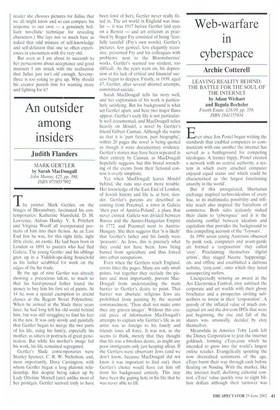An outsider among insiders
Judith Flanders
MARK GERTLER by Sarah MacDougall John Murray, ,f25, pp. 398, ISBN 0719557992 The painter Mark Gertler, on the fringes of Bloomsbury, fascinated his contemporaries: Katherine Mansfield, D. H. Lawrence, Aldous Huxley. V. S. Pritchett and Virginia Woolf all incorporated portraits of him into their fiction. As an East End Jew he was, for this right little, tight little circle, an exotic. He had been born in London in 1891 to parents who had fled Galicia. The young Gertler and his siblings grew up in a Yiddish-speaking household as his father scrabbled for work on the edges of the fur trade.
By the age of nine Gertler was already showing a precocious talent, so much so that his hard-pressed father found the money to buy him his first set of paints. At 14 he won a special exemption to attend classes at the Regent Street Polytechnic. When he arrived at the Slade three years later, he had long left his old world behind him, but was still struggling to find his feet in the new. It was only slowly and painfully that Gertler began to merge the two parts of his life, using his family, especially his mother, as sitters in portraits of great penetration, But while his mother's image fed his work, his life remained segregated.
Gertler's Slade contemporaries were Stanley Spencer, C. R. W, Nicholson, and, most importantly, Dora Carrington, with whom Gertler began a long platonic relationship. But despite being taken up by Lady Ottoline Morrell (and, unlike most of her protege's, Gertler seemed truly to have
been fond of her), Gertler never really fitted in. The art world in England was insular — it was 1917 before Gertler laid eyes on a Renoir — and art criticism as practised by Roger Fry consisted of being 'fearfully tasteful' (Fry's own words). Gertler's pictures, less genteel, less elegantly recessive, presented Fry and his colleagues with problems: next to the Bloomsberries' works. Gertler's seemed too strident, too difficult. As the years went on, his depression at his lack of critical and financial success began to deepen. Finally, in 1939, aged 47, Gertler, after several aborted attempts, committed suicide.
Sarah MacDougall tells his story well, and her exploration of his work is particularly satisfying. But his background is what set Gertler apart, and here two major flaws appear. Gertler's early life is not particularly well documented, and MacDougall relies heavily on Mendel, a novel by Gertler's friend Gilbert Carman. Although she warns us that it is `part fiction, part biography', within 20 pages the novel is being quoted as though it were documentary evidence. Gertler's stories may have been repeated in their entirety by Cannan, as MacDougall hopefully suggests, but this brutal wrenching of the events from their fictional context is overly simplistic.
Yet when MacDougall leaves Mendel behind, she runs into even more trouble. Her knowledge of the East End of London, of Jewish history and life is, at best, slender. Gertler's parents are described as coming from Przemsyl, a town in Galicia 'then part of Austria-Poland', a place that never existed. Galicia was divided between Russia and the Austro-Hungarian Empire in 1772. and Przemsyl went to AustriaHungary. She then suggests that 'it is likely' that Gertler's father and his family were 'peasants'. As Jews, this is precisely what they could not have been, Jews being barred from agriculture and thus forced into urban occupations.
Even when the Gertlers reach England, errors litter the pages. Many are only small points, but together they occlude the picture and, most importantly, prevent MacDougall from understanding the main barrier to Gertler's desire to paint. That barrier was absolute: religious Jews are prohibited from painting by the second commandment, 'Thou shalt not make unto thee any graven images'. Without this crucial piece of information MacDougall's attempts to explain why Gertler's life as an artist was so foreign to his family and friends loses all force. It was not, as she seems to think, merely that they thought that his was a frivolous desire, as might any poor immigrants only just keeping afloat. If the Gertlers were observant Jews (and we don't know, because MacDougall did not know it was important to find out), then Gertler's choice would have cut him off from his background entirely. This may have been the gaping hole in his life that he was never able to fill.


































































 Previous page
Previous page